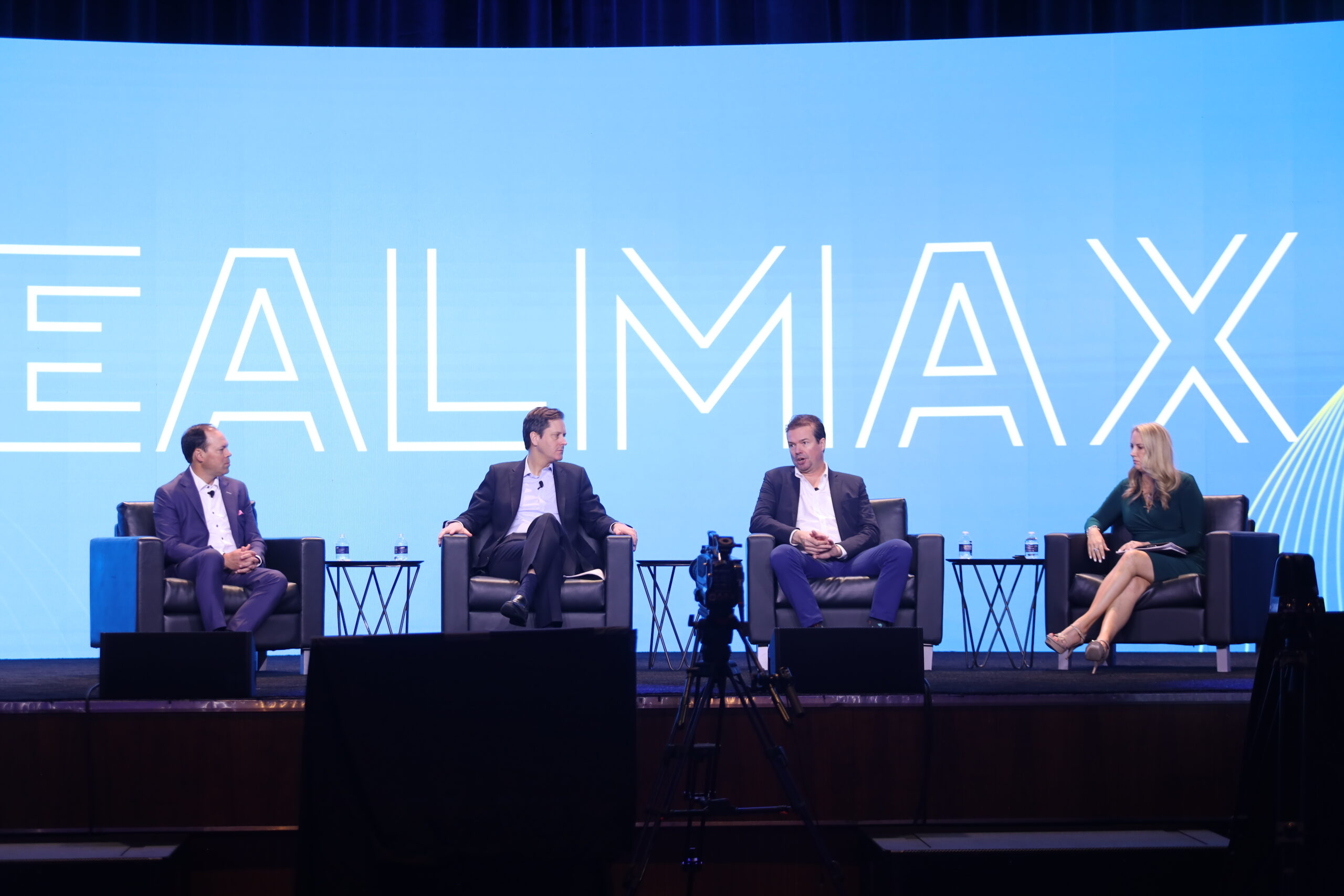DealMAX Keynote Speakers Talk Interest Rates, AI and More
At the Aria Resort & Casino, experts offered their take on top-of-mind M&A trends

For the middle-market dealmakers and dealmaking partners who gathered at the Aria Resort for ACG’s DealMAX conference late last month, an uncertain economic environment remained top-of-mind.
But it’s not just the future of interest rates that leaves the M&A community confounded. Other market forces including technological disruption and shifting labor trends have dealmakers remaining vigilant.
Offering their insights into these topics and more, experts delivered keynote addresses to DealMAX attendees on Tuesday, April 30. Read on to explore some of the highlights.
Reasons for Optimism Despite High Interest Rates
In the day’s first keynote, William Blair Economist Richard de Chazal, GF Data Managing Director Bob Dunn and Insperity’s Senior Business Performance Consultant Donna JW Hare shared their views on the economic environment, the M&A outlook and talent trends.
ACG Event Recap
WHAT: DealMAX Keynote Addresses
WHERE: Aria Resort & Casino in Las Vegas, NV
WHEN: April 30, 2024
THE TAKEAWAY: Interest rates, valuation gaps, AI and labor shifts remain key focuses for middle-market dealmakers headed into the back-half of 2024.
The Keynote was sponsored by FORVIS, GF Data and Insperity.
Looking at Q1 findings, GF Data’s Dunn said that while deal flow has declined, valuations for middle-market deals have actually held up until recently, which he views as a good sign. It means sellers are becoming more realistic about valuation expectations and more mixed-quality companies are coming to market. “We’re actually starting to realize those declines in valuation currently, and I think that is one symptom of what will be a more buoyant market going forward, because we are seeing sellers adjusting their return expectations, getting away from what they expected in 2021 and getting used to a more challenged financing market,” Dunn said.
We’re actually starting to realize those declines in valuation currently, and I think that is one symptom of what will be a more buoyant market going forward.
Bob Dunn
GF Data
Speaking to broader economic conditions, de Chazal said that fears of a recession had abated, the economy appears to have arrived at a soft landing for now and inflation had been tamped down somewhat. Interest rates are expected to remain high for a time, however, which could continue to weigh on M&A. “I think we’ve seen a huge backup in expected rate moves,” he said. “At the start of the year, the market was expecting six or seven rate cuts. Now they’re down to one, maybe none,” de Chazal said.
Still, he cited several reasons for optimism, including technological innovation in AI, digitization and nanotechnology, where “there’s a huge incentive for the corporate sector to invest going forward.”
Addressing talent trends, Insperity’s Hare said the workforce is changing and so is companies’ approach to talent. Gen Z is overtaking Boomers in the workforce for the first time, which is leading companies to approach HR differently. “What we’re seeing with our private equity-backed clients is not just buying a company and running it as-is. We’re seeing a lot of transformation,” she said. “There are a lot of things happening with a multigenerational workforce that are causing companies to be more intentional about their acquisitions and how they’re going to create that employee experience.”
The younger generations care more about things like fertility benefits, parental leave and mental health. “Companies that are investing in these areas, which is the fuzzy bunny, purple flower stuff of HR, typically outperform their competitors,” Hare said.
A Return to Normalcy
Bank of Montreal (BMO) Chief Investment Strategist Brian Belski offered the second keynote of the day with a colorful, comedic yet poignant take on what’s ahead for investors.
Speaking on everything from artificial intelligence to his rules of investing, Belski offered an optimistic stance on the future of investing, looking to quell the anxieties that many dealmakers hold today as interest rates remain elevated, with no relief in sight.
Breaking it down by the sectors about which investors may be feeling the most pessimistic, the strategist noted that while interest rates remain elevated, “we’re entering normalcy” when it comes to mortgage rates and housing prices, reminding investors that the 3% interest rates of late 2020 and early 2021 were, in fact, not normal.
PE-backed companies will do really well in the second half of ’24 and into the next few years, because the coast is going to be clear and equity performance will be more positive.
Brian Belski
BMO Bank of Montreal
When it comes to mergers and acquisitions activity, Belski pointed to financial services and consumer products as particularly bright spots. He expects “a ton of consolidation” in both sectors, in large part because both are quite tech-forward. Technology will be a driving force behind investment activity in the years ahead, and yes, he agreed, AI will be at the center of much of that activity. “AI is real,” he said, “and it’s not just in video, and it’s not just in Tesla. It’s companies like Oracle. Companies like McDonalds. Companies like Kraft Heinz. They are all using it. It’s the real deal, and it’s not going to take jobs—it’s going to be increasing jobs.”
The U.S. will be at the epicenter of this shift (“America owns AI—full stop,” Belski stated), and while investors may be looking to Europe and China in hopes of predicting the next big emerging market, it’s the U.S. market that will see an M&A surge, the strategist said.
Again, he emphasized a return to normalcy for private equity M&A. “PE-backed companies will do really well in the second half of ’24 and into the next few years, because the coast is going to be clear and equity performance will be more positive,” Belski forcasted.
Middle Market Growth is produced by the Association for Corporate Growth. To learn more about the organization and how to become a member, visit www.acg.org.


